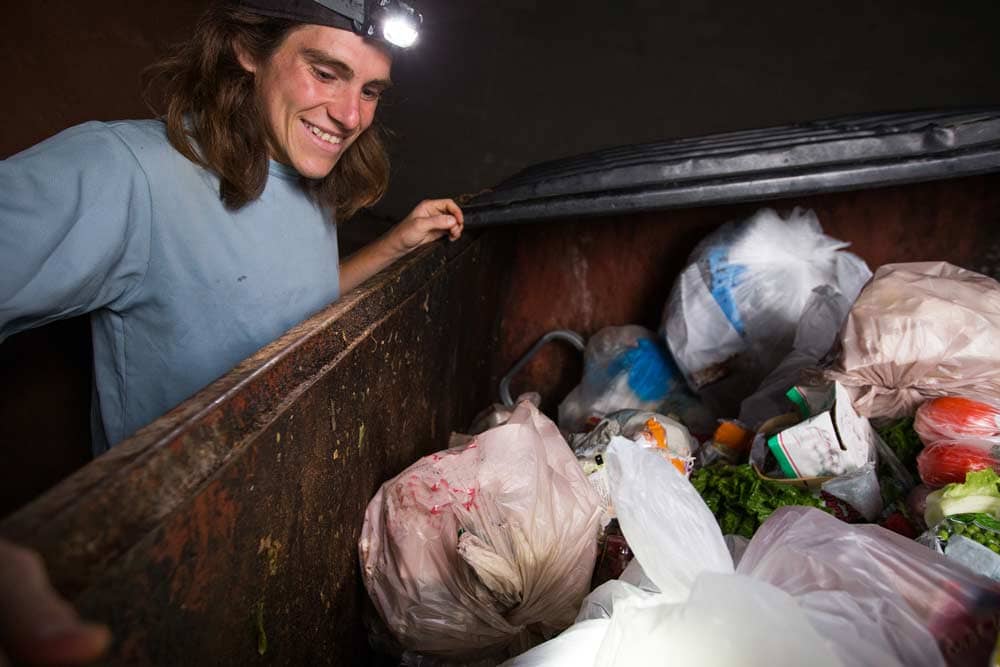Malta has one of the highest waste generation rates per capita within the EU. 22% or nearly a quarter of food bought in Malta ends up wasted and thrown away. Malta exceeds the EU average by 24%, and it does not seem to be slowing down. Can we do something about it?
Do you ever wonder where all the expired food at the supermarket or the pastries left on the grocery display go? The answer is simple; most of it gets thrown away. Today’s consumption habits are a big part of the threatening issues that our planet is facing. Food waste is one of the biggest contributors to greenhouse gases amongst other dangerous industries such as fast fashion and transport. ‘Freegans’ have already initiated the food-saving conversation and are taking a stand against this over-consuming culture.
What is Freeganism?
Freeganism is a lifestyle which focuses on adopting an alternative means to modern capitalism and distancing oneself from material needs. It is considered a new social movement. The ideology of a freegan is to mitigate and refrain from capitalistic practices such as gross over-production and over-indulgences. Abiding by this lifestyle means that you have limited participation in the conventional economy; that means avoiding goods which are not produced sustainably, and shopping second-hand items. Freegans represent the culture of unwillingness to buy into any part of the wasteful food system. Alex V. Barnard, author of Freegans: Diving Into the Wealth of Food Waste in America, describes the movement as ‘A form of ethical consumption that rejects ethical consumption.’
The aim of freegans is to channel people’s behaviour and desire to do good through the way they consume. Many freegans don’t perceive themselves as free-loaders, as they form part of NGOs and help out most minority groups through their work. The main practices carried out by freegans include: seeking to act against animal cruelty, human rights abuses, and environmental destruction as well as capitalistic exploitations that create greed, mass production, and over-consumption.
The term ‘freegan’ came from the founder of Food Not Bombs, which is an NGO based in Massachusetts, USA but has spread across the globe and has been active for over 30 years. Although the movement has been around in various forms for many decades, freeganism and the freegan lifestyle gained notoriety in the mid 2000s all over the world, but especially in the United States, United Kingdom, and Australia. During the mid-2000s, freegans brought the issue of food waste to the world’s attention, revealing the excessive effects of capitalism by exposing disposal sites. NGO groups such as freegan.info in New York organise dumpster tours for the general public to show them where most good food is wasted and how they can collect food.
What is Dumpster-Diving?
One of the more unorthodox practices of some freegans is the process of turning garbage into groceries, also known as ‘dumpster-diving’. Dumpster-diving refers to reclaiming (mainly food) items that are thrown away without being consumed.

You might assume that if something is thrown out, then it is free to take, but dumpster-diving is barely legal anywhere in the world. However, the way police handle dumpster-diving is highly dependent on the country’s culture. For example, dumpster-diving is not criminalised in Sweden, whereas in Germany it is considered a crime. In fact, university students in Sweden have created organisations that allow students who dumpster-dive to share food together.
Is Dumpster-diving Illegal in Malta?
Locally, dumpster-diving is considered illegal. The Environment & Resources Authority explained how, ‘whilst we commend initiatives that reduce food wastage, one must keep in mind that in line with regulation 6(1) of the Abandonment, Dumping And Disposal Of Waste In Streets And Public Places Or Areas Regulations, S.L.549.40, “No person shall sort or collect any refuse deposited for collection at any place or while being transported after collection, unless such sorting is lawfully authorized”. Refuse is defined in regulation 2 of the same regulations as “domestic or commercial waste placed for collection either by the Local Council’s approved agent or contractor or by a registered waste carrier.”’
When the dumpster is located on private premises, dumpster-diving is considered trespassing, therefore store managers may lock dumpsters to prevent freegans from gathering food that has been thrown away. While this might sound draconian, they might choose to do so to protect their property and to limit potential liability if a dumpster diver is injured on their property.
The Freegan Lifestyle
The principles of freeganism are clearly all about reducing waste, recycling and donating food to shelters, and trying to save the world from capitalism. Freegans meet their basic needs by choosing to go out in nature and gather food from the woods or fields: being ecological and self-sufficient instead of buying items off a supermarket shelf. Volunteering, thrift shopping, DIY projects, and sharing accommodation or squatting (living in abandoned buildings) are other ways that freegans opt to live their lives. They refuse to work 40 hours a week for money in order to consume and then waste. Oftentimes when a group goes dumpster-diving, they organise a community lunch which is open to everyone. Freegans take time to prepare delicious meals from ingredients saved and serve them to the people (on donation basis without any obligations). These community lunches enhance a sharing culture and tend to bring people together.
However, there are more advantages associated with the freegan lifestyle, because a freegan contributes to food waste reduction by salvaging food and other items rather than discarding them. Another advantage is saving money and obtaining free food. We spoke to several people who have tried dumpster-diving before, and some said that it almost feels like finding ‘hidden treasure’ when saving large amounts of food. For example, finding discarded avocados, which would have been bought for around €2 each.

‘Most common foods that are thrown away by supermarkets and restaurants are bread, fruit and vegetables, and biscuits or sweets,’ said a regular dumpster diver, ‘but on a lucky day, you can also find poultry, meat, cheese, or chocolate. Imagining a dumpster full of garbage, filled with items that consumers didn’t buy can be a disgusting thought; however, most bread is fresh. So are most fruits and vegetables; nevertheless, everything needs to be washed and cleaned from any contamination.’
In most European countries, a passive way of being a freegan is by using mobile applications which allow you to contribute to food waste prevention. These include the apps Too Good to Go and Karma. Basically businesses such as cafes or supermarkets subscribe to these applications, and towards the end of day, they sell unsold items at a cheaper price in order to avoid throwing them away. A few days ago, a similar mobile app was launched in Malta. The app is called Save the Food, and it was developed by Prof. Alexiei Dingli.
An Extreme Solution to an Extreme Problem
Being a freegan means that you are living an ethical life to the extreme. However, most people look at freegans in a different light; they tend to assume one is homeless or poor. The social stigma can easily stop someone who wants to save food, like freegans do. Dumpster-diving, for instance, is one of the most unlikely activities that one would witness in Malta.
Freegans are fighting the traditional food system, utilising the spoils of wasteful practices. How long are we going to talk about this problem? Food waste is a huge threat to our environment; food production and its wasteful packaging are using excessive natural resources, which will run out eventually. Freegans and the aforementioned food-saving communities are a good example of moving forward in order to change habitual ways of consuming and help us rethink our own day-to-day consumption patterns.
Further Reading
Barnard, A. (2011). ‘Waving the banana’ at capitalism: Political theater and social movement strategy among New York’s ‘freegan’ dumpster divers. Ethnography, 12(4), 419-444. doi: 10.1177/1466138110392453
Brown, C. (2016). Freeganism: food waste’s first wave. Retrieved 30 May 2022, from https://thecounter.org/freeganism-alex-barnard/
Cooks, Leda M. (2017). The End(s) of Freeganism and the Cultural Production of Food Waste. Retrieved from https://scholarworks.umass.edu/communication_faculty_pubs/54.Perma/Culture: Imagining Alternatives in an Age of Crisis. 54.
Moré, V. (2011). Dumpster Dinners: An Ethnographic Study of Freeganism. Journal For Undergraduate Ethnography, 1(1). doi: 10.15273/jue.v1i1.8004
Thompson, K. (2017). Freeganism – Definition and Overview of the Movement. Retrieved 30 May 2022, from https://revisesociology.com/2017/01/15/freeganism-definition-summary-lifestyle/





Comments are closed for this article!